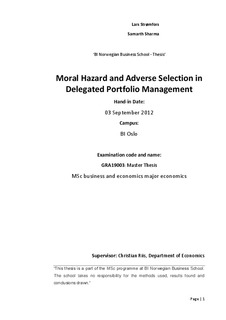| dc.contributor.author | Strømfors, Lars | |
| dc.contributor.author | Sharma, Samarth | |
| dc.date.accessioned | 2013-02-18T10:01:38Z | |
| dc.date.available | 2013-02-18T10:01:38Z | |
| dc.date.issued | 2013-02-18 | |
| dc.identifier.uri | http://hdl.handle.net/11250/95074 | |
| dc.description | Masteroppgave(MSc) in Master of Science in Business, Economics - Handelshøyskolen BI, 2013 | |
| dc.description.abstract | We investigate the investor-manager relationship in a partial equilibrium principal agent model. The industry for the delegated portfolio management is characterized by information asymmetry on many different levels. Investors will have inferior knowledge on the alpha generating ability of a specific manager and the work he puts into his ex-ante analyses or in some cases the gross return generated. Existing literature confirms that there is a large variation mechanism design can be explained through agency frictions caused by uncertainty related to expectations of active management. Our approach internalizes both frictions caused by unobservability of the output and uncertainty related to the quality of the asset manager. We find that screening is more likely to occur when allowing good managers to differentiate themselves by short selling or use of leverage. However, if truth telling is to be insured in all states of nature, a regulator must be careful when restricting the size of short selling or leverage, since this will only influence the lower bound of the wage for the low type in the separation state and not the high bound for the high type. Moreover, we also demonstrate that bad managers can potentially play a role of financial advisors if they have additional information on distribution of managers. | no_NO |
| dc.language.iso | eng | no_NO |
| dc.subject | samfunnsøkonomi economics | |
| dc.title | Moral hazard and adverse selection in delegated portfolio management | no_NO |
| dc.type | Master thesis | no_NO |
